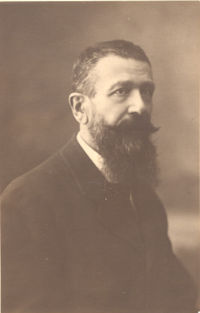Top Qs
Timeline
Chat
Perspective
Cesare Burali-Forti
Italian mathematician (1861–1931) From Wikipedia, the free encyclopedia
Remove ads
Cesare Burali-Forti (13 August 1861 – 21 January 1931) was an Italian mathematician, after whom the Burali-Forti paradox is named. He was a prolific writer, with 180 publications.[1]
Biography
This section needs expansion with: There needs to be more information besides "he was known for the Burali-Forti paradox".. You can help by adding to it. (February 2024) |
Burali-Forti was born in Arezzo, and he obtained his degree from the University of Pisa in 1884.[2] In 1886, after two years of middle-school service in Scicily, Burali-Forti won a competition to become professor of analytic and projective geometry at the military academy in Turin.[3] He was an assistant of Giuseppe Peano in Turin from 1894 to 1896, during which time he discovered a theorem which Bertrand Russell later realised contradicted a previously proved result by Georg Cantor. The contradiction came to be known as the Burali-Forti paradox of Cantorian set theory. He died in Turin.
Remove ads
Books by C. Burali-Forti
- Analyse vectorielle générale: Applications à la mécanique et à la physique. with Roberto Marcolongo (Mattéi & co., Pavia, 1913).
- Corso di geometria analitico-proiettiva per gli allievi della R. Accademia Militare (G. B. Petrini di G. Gallizio, Torino, 1912).
- Geometria descrittiva (S. Lattes & c., Torino, 1921).
- Introduction à la géométrie différentielle, suivant la méthode de H. Grassmann (Gauthier-Villars, 1897).
- Lezioni Di Geometria Metrico-Proiettiva (Fratelli Bocca, Torino, 1904).
- Meccanica razionale with Tommaso Boggio (S. Lattes & c., Torino, 1921).
- Logica Matematica (Hoepli, Milano, 1894).
- Archived 2016-03-04 at the Wayback Machine Complete listing of publications and bibliography, 8 pages.
Remove ads
Bibliography
Primary literature in English translation:
- Jean van Heijenoort, 1967. A Source Book in Mathematical Logic, 1879-1931. Harvard Univ. Press.
- 1897. "A question on transfinite numbers," 104-11.
- 1897. "On well-ordered classes," 111-12.
Secondary literature:
- Ivor Grattan-Guinness, 2000. The Search for Mathematical Roots 1870-1940. Princeton Uni. Press.
References
Further reading
External links
Wikiwand - on
Seamless Wikipedia browsing. On steroids.
Remove ads

